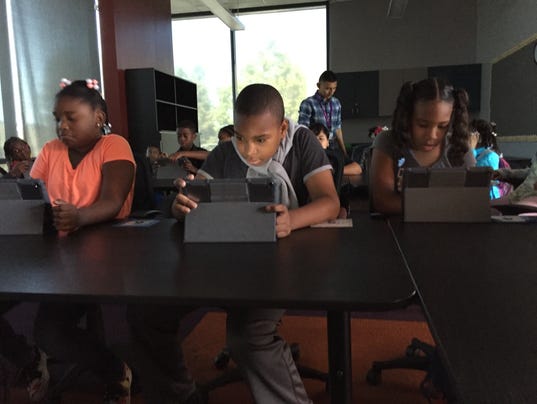Race and gender gaps persist in computer science education
Source: Jessica Guynn
 New research from Google shows that black students are less likely to have computer science classes in school and are less likely to use computers at home even though they are 1.5 times more interested in studying computer science than their white peers.
New research from Google shows that black students are less likely to have computer science classes in school and are less likely to use computers at home even though they are 1.5 times more interested in studying computer science than their white peers.
The findings are part a report released Tuesday by Google in partnership with Gallup that puts the spotlight on the racial and gender gap in K-12 computer science education. Google says its aim with the research, which surveyed thousands of students, parents, teachers, principals and superintendents, is to increase the numbers of women, blacks and Latinos in computer science.
Computer science classes are popping up in K-12 schools around the country. The growing effort is coming from many quarters — the National Science Foundation, the College Board, Freada Kapor's SMASH Academy, Black Girls Code, Girls Who Code, Code.org and major tech companies such as Google — all searching for the best way to put computers and computer know-how in the hands of kids from all racial, ethnic and socioeconomic backgrounds. On Monday, a coalition of computer scientists released a framework for what K-12 students should know about computer science.
Parents and educators have joined the call for computer science classes, leading to a big jump in the number of schools reporting they offer at least one computer science class, 40% up from 25% the year before, says Brandon Busteed, executive director of education and workforce development at Gallup.
Google released research on Tuesday pointing to racial
Google released research on Tuesday pointing to racial gaps in computer science education. (Photo: Google)
But disparities persist in who has access to computer science education. Structural and social barriers still keep girls and underrepresented minorities from studying computer science, says Google's Sepehr Hejazi Moghadam.
"Ultimately we have got to steer away from computer science education being a privilege for some and move towards more broad access to quality computer science learning for all students," Moghadam said.
Silicon Valley's major tech companies are staffed mostly by white and Asian men. Google says it's hiring more black and Hispanic workers: 4% of hires in 2015 were black and 5% were Hispanic in 2015. But the increased hiring has not budged the overall percentage of underrepresented minorities in the Google workforce, with Hispanics making up 3% of the work force and African Americans 2%. Seven out of 10 employees at Google are men.
That's a pressing problem for Google. Latino and African-American buying power is on the rise and Google has ambitions that now lap the globe. Having women and underrepresented minorities brainstorming and building, not just using, the products dreamed up by Google is quickly becoming a necessity.
"For us, a diversity of perspectives, ideas and cultures within the company and the industry overall lead to the creation of better products and services that meet the needs of all users," Moghadam said.
Among the research findings:
- Black students are less likely to have computer science classes in school compared to white or Hispanic students. 47% say they have dedicated computer science classes compared to 58% of white students and 59% of Hispanic students.
- Black and Hispanic students are less likely than white students to use computers at home or at home. 58% of black and 50% of Hispanic students say they use a computer at least most days at home compared to 68% of white students. The research found that students who use computers less at home are less confident in their ability to learn computer science.
- Black and Hispanic students are more likely than white students to have learned computer science outside of the classroom.
- Black and Hispanic students are more likely than their white peers to be interested in learning computer science. Black students are 1.5 times and Hispanic students are 1.7 times as likely as white students to be interested in learning computer science.
- Black and Hispanic parents want their children to learn computer science. Of parents whose child has not learned computer science, 92% of black and Hispanic parents want their children to learn computer science versus 84% of white parents.
- Girls are less likely than boys to report being told by parents or teachers they would be good at computer science (39% versus 56% of boys) and are less likely than boys to be aware of computer science learning opportunities outside of school.
| }
|